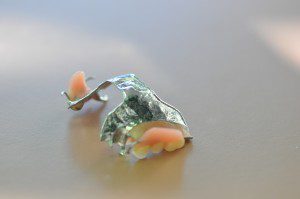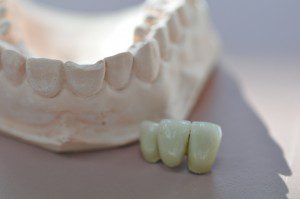Do you have a gappy or gummy smile because of missing teeth? Thanks to progressive dentistry, we’ve come a long way with natural-looking options to replace a missing tooth, several teeth, or all of your teeth.
At Shepherds Hill Dental Centre, we offer three main ways to replace a missing tooth: dentures, bridges and dental implants. Here, Dr Tharaka Narayana runs through the pros and cons of each.
Why can’t I just live with the gap?
In some cases, patients may be comfortable with a gap. However, most people choose to replace a tooth for two main reasons:
-

“If you are considering doing nothing to replace your missing tooth it is important to check that there are no functional issues or impacts that you might not be aware of.” Dr Tharaka Narayana discusses the options for people who are missing teeth. Aesthetics
“For some people, they want to replace a missing tooth for aesthetic reasons, especially if it’s in the front area of their mouth,” says Dr Narayana.
- Functionality
“If a back tooth is missing, this can take away from the teeth’s chewing power; several missing teeth can mean an inability to chew properly at all. When you’re missing one or many teeth, it can also be a concern for the remaining teeth because this puts extra pressure on them and can cause fractures.”
What do I need to consider when replacing missing teeth?
When choosing from tooth replacement options, we find the decision for most patients comes down to three factors:
- Removable or fixed
“A fixed tooth replacement is really the way to go for most patients because a removable one can be annoying for many patients,” believes Dr Narayana.
“Some people like the fact that they can remove their teeth at night, however the benefits of non-removable options are that they feel closer to real teeth and are often a lot easier to look after. With any tooth replacement option, they need to be well cleaned and maintained, and the adjacent, foundation teeth need to be kept in perfect condition to avoid decay and gum disease.”
- Longevity
“All these ways to replace a missing tooth tend to last a fair while, although a tooth replacement will wear down like natural teeth. Dental implants can last a lifetime in the right patient, with the right care. But if the patient doesn’t care for their teeth at home or have regular hygiene visits, they probably won’t last as long. Mostly, we replace dentures because people drop them!”
- Cost
“For some people, the choice comes down to their budget. Doing nothing, of course, is the cheapest option. Often, removable options tend to be cheaper than fixed options.”
OPTION 1: no dental treatment
“If a person who has missing teeth isn’t worried about the aesthetics and isn’t adversely affected functionally, we just tend to leave it be,” says Dr Narayana.
“Doing nothing isn’t a bad option sometimes. Some people prefer to keep things simple!”
OPTION 2: dentures
While you might think ‘falsies’ are just for elderly people, dentures offer many cost-effective solutions for patients wanting to replace one or more missing teeth. There are various types of dentures available and whether you have partial dentures or complete dentures will depend on how many teeth you’re missing.
Dentures are removable prosthetic teeth (made from acrylic, resin or porcelain) that are fixed in a plate made from acrylic or acrylic/metal (called chrome cobalt).
“We use both acrylic or chrome cobalt dentures at our practice and make the decision based on the patient’s circumstances,” explains Dr Narayana.
“Chrome cobalt is slightly dearer, but it’s generally more durable and easier to tolerate by the patient. The downside is that it’s often a little harder to add new teeth to the plate. So if it looks like you might lose another tooth in a year’s time, to make it easier we’ll work with an acrylic plate.”
It’s important for dentures to fit your teeth and gums closely, so they look, feel and function as naturally as possible. “We don’t outsource the fabrication of our dentures to an overseas technician because it’s cheaper; we use a local technician with whom we have a close working relationship and trust.”
OPTION 3: bridges
“While bridges can be used to replace one or several missing teeth, they’re becoming less prevalent because of the popularity of dental implants now,” says Dr Narayana. “However, they’re still suitable for people who don’t want an implant or aren’t suited to this treatment.”
 What is a dental bridge?
What is a dental bridge?
“Essentially, it’s just a false tooth that’s positioned in the gap and held in by placing a crown on the natural tooth next to it, or to two teeth on either side of it. For several missing teeth, we might insert two or three prosthetic teeth to build a ‘bridge’ across a larger gap.”
Are bridges cheaper than dental implants?
“Slightly, but by the time you fabricate the prosthetic teeth and do the crowns procedure, it’s getting close to the same price of an implant. Because they cost roughly the same, most people prefer to have dental implants. They’re also fixed rather than removable like dentures, and you don’t have to invasively reshape the adjacent teeth.”
The downsides of bridges?
“There’s a limit to what you can do with bridges – we can’t replace five or six teeth in a row with a huge bridge because it will just break. Also, cleaning long-span dentures can be tricky.”
OPTION 4: dental implants
 “When it comes to ways to replace a missing tooth, the gold standard in restorative dentistry is a dental implant,” says Dr Narayana. “This involves having a titanium screw inserted into the jaw bone, then a crown that locks on to it via an interface called an abutment. This is as close as you can get to a real tooth in terms of how it feels and functions.
“When it comes to ways to replace a missing tooth, the gold standard in restorative dentistry is a dental implant,” says Dr Narayana. “This involves having a titanium screw inserted into the jaw bone, then a crown that locks on to it via an interface called an abutment. This is as close as you can get to a real tooth in terms of how it feels and functions.
“The limitation, though, is that not all patients are able to have dental implants – there are certain surgical and restorative suitability criteria. From a surgical aspect, we need to check if they have enough healthy bone in which to implant the screw. From a restorative aspect, there has to be enough space to put on a crown.”
After dental implants are placed, you still need to clean them well because bacteria can attack the foundation of the implant and result in gum disease.
How do I know which option is best for me?
Replacing missing teeth can really help you smile, speak and eat again with confidence. If you’d like to discuss these ways to replace a missing tooth and which option would suit your individual situation, see one of our friendly dentists. Call us now for an appointment on 08 8278 6858 or book online.



 What is a dental bridge?
What is a dental bridge?